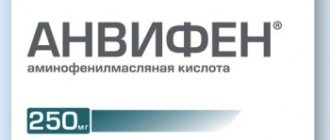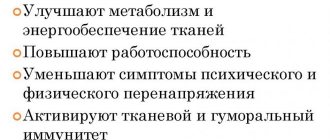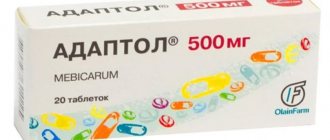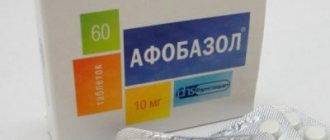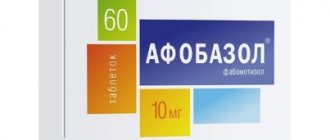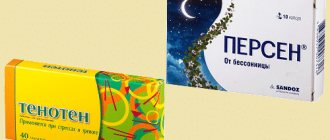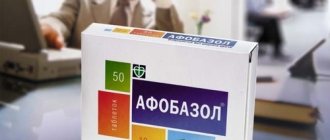Update date: 01/11/2021 15:54:46 3393 Share:
Author: Maria Feldshtein
*Review of the best according to the editors of simplerule.ru. About the selection criteria. This material is subjective in nature, does not constitute advertising and does not serve as a purchase guide. Before purchasing, consultation with a specialist is required.
According to medical statistics, about 4% of the world's population suffers from anxiety disorders. Interestingly, in Europe and North America this condition occurs more often - on average in 7.7% of people, while in Asia - only in 2.8%.
In the treatment of such disorders, drugs of various pharmacological groups are used - in particular, anxiolytics and nootropics. Representatives of these categories of drugs include Afobazole and Phenibut. The drugs differ in composition and mechanism of action, but are prescribed in similar situations. What is the difference between them - read the article.
| The drug and its characteristics | Phenibut | Afobazole |
| Pharmacological group | Nootropic drugs | Anxiolytics - anti-anxiety drugs |
| Active substance | γ-amino-β-phenylbutyric acid hydrochloride | Fabomotizole hydrochloride |
| Release form | Pills | Pills |
| Manufacturer | “Ozone”, “Organika”, etc. (Russia) | OTCPharm (Russia) |
| Price | 60-250 rub. | 300-400 rub. |
| Vacation at the pharmacy | On prescription | Over the counter |
Indications for use
Afobazole and Phenibut have one common indication - the treatment of anxiety disorders. These drugs calm the nervous system, relieve anxiety and fear, and improve the quality of life.
Other indications for prescribing drugs vary
Afobazole
Afobazole is used for certain somatic diseases accompanied by anxiety - for example, VSD, irritable bowel syndrome, bronchial asthma and hypertension. The drug normalizes brain activity, helps lower blood pressure and stabilizes heart rate. Afobazole is prescribed only in combination with other drugs and is not the only drug in this situation - it relieves accompanying symptoms, but does not treat the underlying disease.
Afobazole is also prescribed in the following situations:
- premenstrual syndrome;
- alcohol withdrawal;
- relief of withdrawal symptoms when quitting smoking;
- sleep disturbances caused by anxiety;
- adaptation disorders.
Phenibut
Phenibut is used in more complex cases:
- obsessive-compulsive neurosis;
- insomnia and nightmares;
- enuresis, stuttering and nervous tics in children;
- Meniere's disease;
- open-angle glaucoma;
- symptomatic therapy in the treatment of alcohol dependence.
Phenibut is also prescribed as a premedication before surgical operations and diagnostic procedures.
Gabapentin addiction
The rapid development of dependence on gabapentin is explained by the rapid emergence of body resistance to a certain dosage of the drug. The desired effect is not achieved, and the withdrawal syndrome makes itself felt fully, which forces the drug addict to increase the dosage.
Overdose
As with any drug, using too much gabapentin can lead to an overdose. The reaction depends on the dose, and it will be individual for everyone: the gastrointestinal tract will react more strongly in some, the heart and blood vessels in others, and others may fall into a coma. In general terms, the symptoms of an overdose are as follows:
- depressed state, drowsiness;
- speech problems;
- double vision;
- breathing problems;
- vomiting and/or diarrhea.
If the dose is very large, death is possible, especially in combination with alcoholic beverages.
Gabapentin poisoning: first aid
In case of overdose, first of all, it is necessary to keep vital functions under control. You should definitely call an ambulance. Primary measures include gastric lavage and taking sorbent medications. There are no antidotes for gabapentin. Treatment is mainly symptomatic, but if necessary, hemodialysis can be performed in a hospital setting. In some cases, resuscitation measures may be required.
Withdrawal
Drug withdrawal, or withdrawal syndrome, can occur even in people who take gabapentin for therapeutic purposes, not to mention pharmaceutical drug addicts. Withdrawal syndrome is characterized by such phenomena as: changes in blood pressure and body temperature, severe pain in joints, muscles, and head. A depressive state reaches its peak, irritability and aggressiveness arise, sleep is disturbed, and appetite disappears.
This condition may last up to 10 days after stopping the drug. Moreover, in a more or less mild version, these manifestations will persist for another 1-1.5 months.
REMOVAL AT HOME
How do drugs work?
Phenibut and Afobazole contain different active ingredients and differ in their mechanism of action.
Phenibut
Aminophenylbutyric acid hydrochloride, the active substance of the drug, affects the functioning of the central nervous system. Being a derivative of GABA, it acts as an inhibitory transmitter. The drug normalizes metabolism and blood flow in brain tissue. It has a weak anticonvulsant effect - and although it is not used as a drug for the treatment of convulsive conditions, it improves the functioning of the central nervous system,
When taking Phenibut as a course:
- reduces manifestations of asthenia;
- relieves vegetative symptoms;
- eliminates feelings of anxiety and fear;
- improves attention and memory;
- increases mental and physical performance;
- normalizes sleep.
The nootropic drug, according to the official instructions, penetrates all tissues of the body, passes into the brain, is well distributed in the liver and kidneys, but does not accumulate and is released within three hours after administration. In brain tissue, the concentration of the drug remains high for 6 hours.
Afobazole
Fabomotizol in the drug also acts on the central nervous system, but it works through other structures - sigma-1 receptors. The drug restores the sensitivity of these receptors to inhibitory mediators and has a calming effect on the central nervous system.
Afobazole works in two directions at once. As an anxiolytic, it relieves feelings of anxiety and fear, eliminates irritability and tearfulness, helps to relax and normalizes sleep. As a stimulant, it improves brain activity. Afobazole also eliminates vegetative symptoms that occur due to anxiety - sweating, rapid heartbeat, dry mouth, dizziness, etc.
Description of Phenibut
The nootropic and psychostimulant drug Phenibut contains the same component in its composition. Manufacturer: Obninsk CFC for Rick-Pharma in the Russian Federation. Available in tablets.
Its dominant actions are antiamnestic and antihypoxic, which allows Phenibut to be used for cognitive impairment, disorders of the vestibular system and for the prevention of the consequences of head injuries.
Additional actions - anxiolytic, antiplatelet, psychostimulant. The drug reduces the manifestations of asthenia, normalizes sleep, eliminates increased irritability and lability. It also helps improve mental and physical performance.
Phenibut is used for memory and attention disorders, to increase initiative and interest. Already from the first days of treatment, it improves the objective well-being of patients with asthenia.
Research and effectiveness
Nootropic drugs have no FDA-approved indications. There is no objective evidence of their effectiveness. Since 1997, only 2 clinical trials of the drug have been conducted. None of the listed indications for use have the specified degree of evidence.
Contraindications
Phenibut is not used if you are intolerant to the components in the composition. It is contraindicated during pregnancy, lactation, and in case of insufficient renal function. In pediatrics, it can be prescribed no earlier than 8 years.
Side symptoms
Side effects during Phenibut therapy may include:
- nausea - often occurs at the beginning of therapy;
- hepatotoxicity – with long-term use in high doses;
- emotional lability, insomnia - observed more often in children.
- If other side symptoms appear, you should talk to your doctor.
Dosage
Phenibut is taken before meals. For asthenia and anxiety, adults drink 250-500 mg 3 times a day. From 8 years - 250 mg 3 times, after 14 years adult doses are used. The maximum dosage is 750 mg, in old age – 500 mg.
An increased dose of 750 mg is used for exacerbation of Meniere's disease, for a one-time elimination of dizziness and vestibular disorders. To prevent motion sickness, use 250 mg 3 times a day.
The duration of treatment varies depending on the disease. The drug can be used for a long course - 4-6 weeks or more.
Phenibut is a low-toxic drug, so an overdose is unlikely. The drug will be hepatotoxic when consumed 7-14 g of the drug per day. Then there may be liver dystrophy and eosinophilia develops. Possible symptoms of overdose are hypotension, nausea, vomiting. There is a risk of kidney failure.
Who is it suitable for?
The medicine Phenibut can be prescribed by a doctor for:
- memory and attention disorders;
- insomnia and other sleep disorders;
- decreased emotional activity;
- tics, urinary incontinence, stuttering;
- Mainer's disease;
- dysfunctions of the vestibular apparatus.
The drug is also used in the complex treatment of alcoholism, when it is necessary to relieve somatovegetative and psychopathological disorders that accompany abstinence.
Assessing the effectiveness of drugs
Comparative studies of the two drugs - Phenibut and Afobazole - have not yet been conducted. Since Phenibut is more often used in psychiatry, and Afobazole is used as an adjuvant for mild anxiety disorders, their scope of use usually does not overlap. Therefore, we studied each drug separately and can evaluate them in terms of effectiveness and safety.
Phenibut
In the international medical knowledge base PubMed, there are about 200 articles on the active substance included in the drug - but most of them describe the effect of the drug in laboratory conditions (in vitro). Tests on humans are also available, but they do not meet international standards. For example, there is evidence that the drug:
- tension headaches in children and adolescents;
- fight chronic fatigue;
- used in children;
- helps to cope with;
- alleviates the condition.
But from the standpoint of evidence-based medicine, Phenibut is considered an ineffective drug.
Afobazole
There is also no serious evidence base for Afobazole. They talk about him only in Russian-language literature:
- Afobazole for anxiety and neuroses. There is evidence that the drug acts slowly but effectively: it improves well-being in the 4th week of treatment and causes virtually no adverse reactions.
- Afobazole and for generalized anxiety disorders. Scientists believe that the drug can be used over a long course without reducing its effectiveness.
- There is no mention of this drug in PubMed or the Cochrane Library.
Afobazol - instructions for use
Where can I buy?
Registration number : LP-006555 Trade name of the drug: Afobazol® Retard INN or group name: fabomotizol Dosage form: extended-release film-coated tablets
the only* over-the-counter anti-anxiety drug that is used once a day *according to GRLS data as of 04/01/2021
Composition per tablet:
Active substance:
fabomotizole (fabomotizole dihydrochloride) – 30.0 mg.
Excipients:
Kollidon® SR [polyvinyl acetate, povidone, sodium lauryl sulfate, silicon dioxide] - 120.0 mg, hypromellose - 25.0 mg, lactose - 23.0 mg, magnesium stearate - 2.0 mg.
Shell composition:
Opadry II 85 F18422 white [polyvinyl alcohol, partially hydrolyzed, titanium dioxide, macrogol 4000, talc] - 6.0 mg.
Description: round, biconvex, almost white film-coated tablets. On a cross section, the kernel is almost white or white with a yellowish-brownish tint.
Pharmacotherapeutic group: anxiolytic agent (tranquilizer).
ATX code: N05BX.
Pharmacodynamics.
Afobazol® Retard is a selective non-benzodiazepine anxiolytic.
Acting on sigma-1 receptors in nerve cells of the brain, Afobazol® Retard stabilizes GABA/benzodiazepine receptors and restores their sensitivity to endogenous inhibitory mediators. Afobazol® Retard also increases the bioenergetic potential of neurons and has a neuroprotective effect: it restores and protects nerve cells.
The effect of the drug is realized primarily as a combination of anxiolytic (anti-anxiety) and mild stimulating (activating) effects.
Afobazole® Retard reduces or eliminates feelings of anxiety (concern, bad feelings, fears), irritability, tension (fearfulness, tearfulness, anxiety, inability to relax, insomnia, fear), depressive mood, somatic manifestations of anxiety (muscular, sensory, cardiovascular , respiratory, gastrointestinal symptoms), autonomic disorders (dry mouth, sweating, dizziness), cognitive disorders (difficulty concentrating, weakened memory), incl. arising from stress disorders (adaptation disorders). The use of the drug is especially indicated in persons with predominantly asthenic personality traits in the form of anxious suspiciousness, uncertainty, increased vulnerability and emotional lability, and a tendency to emotional stress reactions.
Afobazole® Retard does not cause muscle weakness, drowsiness and does not have a negative effect on concentration and memory. When using it, addiction does not form, drug dependence does not develop, and “withdrawal” syndrome does not develop.
Pharmacokinetics.
After oral administration, Afobazol® Retard is well and quickly absorbed from the gastrointestinal tract. Food intake does not affect the absorption of the drug and the pharmacokinetic parameters.
The maximum concentration of the drug in plasma (Cmax) after a single dose is 47.740 + 43.252 ng/ml, after multiple doses - 27.668 + 13.770 ng/ml; time to reach maximum concentration (Tmax) – 2.1+1.1 and 2.6+1.0 hours after single and multiple doses, respectively.
Metabolism: Afobazole® Retard undergoes a “first pass effect” through the liver; the main directions of metabolism are hydroxylation at the aromatic ring of the benzimidazole ring and oxidation at the morpholine fragment.
Afobazol® Retard is intensively distributed throughout well-vascularized organs; it is characterized by rapid transfer from the central pool (blood plasma) to the peripheral (highly vascularized organs and tissues).
The half-life of Afobazol® Retard when taken orally is 8.41+5.01 hours after a single dose and 6.05+3.54 hours after multiple doses. The drug is excreted mainly in the form of metabolites and partially unchanged by the kidneys and through the intestines.
Indications for use.
Afobazol® Retard is used in adults for anxiety conditions: generalized anxiety disorders, neurasthenia, adaptation disorders, in patients with various somatic diseases (bronchial asthma, irritable bowel syndrome, systemic lupus erythematosus, coronary heart disease, hypertension, arrhythmias), dermatological, oncological and other diseases; in the treatment of sleep disorders associated with anxiety.
Contraindications.
- Hypersensitivity to fabomotizole and/or any excipient in the drug.
- Galactose intolerance, lactase deficiency, glucose-galactose malabsorption.
- Pregnancy, breastfeeding period.
- Children under 18 years of age.
If you have one of the diseases listed above, you should consult your doctor before using the drug.
Use during pregnancy and breastfeeding.
The use of Afobazol® Retard is contraindicated during pregnancy.
If it is necessary to use the drug during lactation, breastfeeding should be discontinued.
Before using Afobazol® Retard, if you are pregnant or think you might be pregnant, or are planning a pregnancy, you should consult your doctor.
Method of administration and dose.
Used internally.
1 tablet 1 time per day, in the morning, regardless of meals.
The duration of the course of use of the drug is 2–4 weeks.
If there is no improvement after treatment, or symptoms worsen, or new symptoms appear, you should consult your doctor.
Use the drug only according to the indications, method of administration and in the doses indicated in the instructions.
Side effects.
Undesirable effects that may develop during treatment with Afobazol® Retard are classified according to the following frequency of occurrence:
very often (> 1/10), often (from > 1/100 to < 1/10), infrequently (from > 1/1,000 to < 1/100), rarely (from > 1/10,000 to < 1/10) 1,000), very rare (< 1/10,000), frequency unknown (cannot be determined from available data).
From the immune system: frequency unknown - allergic reactions.
From the nervous system: rarely - headache, which usually goes away on its own and does not require discontinuation of the drug.
If you experience the side effects listed in the instructions, or they get worse, or you notice any other side effects not listed in the instructions, tell your doctor.
—>
Overdose.
Symptoms With significant overdose and intoxication, the development of sedation and increased drowsiness without manifestations of muscle relaxation is possible. Treatment. As an emergency solution, caffeine 20% solution in 1.0 ml ampoules is used 2-3 times a day subcutaneously.
If symptoms of overdose appear, stop taking the drug and consult a doctor immediately.
Interaction with other drugs.
Afobazole® Retard does not interact with ethanol and does not affect the hypnotic effect of thiopental. Enhances the anticonvulsant effect of carbamazepine. Causes an increase in the anxiolytic effect of diazepam.
If you are using the above or other medications (including over-the-counter medications), consult your doctor before using Afobazol® Retard.
Influence on the ability to drive vehicles and machinery.
The drug does not have a negative effect on driving vehicles and performing potentially hazardous activities that require increased concentration and speed of psychomotor reactions.
Release form.
Extended-release film-coated tablets, 30 mg.
20 tablets each in a blister pack made of polyvinyl chloride film and printed varnished aluminum foil.
1 blister pack with instructions for use is placed in a cardboard pack.
Storage conditions.
At a temperature not higher than 25 ºС. Keep out of the reach of children.
Best before date.
2 years. Do not use after the expiration date stated on the packaging.
Vacation conditions.
Over the counter.
Marketing authorization holder/organization receiving consumer complaints
OTCPharm JSC, Russia, 123112, Moscow, st. Testovskaya, 10. Tel., fax. www.otcpharm.ru
, 305022, Russia, Kursk, st. 2nd Aggregatnaya, 1a/18 tel./fax, www.pharmstd.ru
Adverse reactions
According to the instructions, the drugs can cause the following symptoms:
- Phenibut: irritability, increased excitability, increased anxiety, headache, dizziness, drowsiness, skin rash. At the beginning of therapy there may be nausea.
- Afobazole: allergic reactions. There may be a headache, but it goes away on its own and does not require cessation of therapy.
Interaction with other drugs
When taking Phenibut simultaneously with hypnotics, antiepileptics, antipsychotics and antiparkinsonian drugs, as well as narcotic analgesics, the duration and strength of their effect on the body increases.
But is there compatibility between Afobazole and Phenibut? To answer this question, you should characterize the second drug and find out which pharmacological group it belongs to.
What's better
So what is more effective: Phenibut or Afobazol? This issue can only be decided by a doctor on an individual basis. Only a specialist will determine the presence of indications, contraindications and concomitant diseases. After all, drugs have different effects on the human body and have different compositions. Often, the effectiveness of the drug depends on the condition and individual response of the person and the type of disease.
In the event that a person is in a prolonged state of stress, without cerebral circulation impairment, then Afobazol, which is a more modern and safe remedy, will be the best. If there are cerebral circulation disorders or the child needs treatment, then it is better to choose Phenibut.
Therefore, it is almost impossible to identify the best drug; it all depends on the specific situation and the individual reaction of the human body. But in any case, before taking any of the drugs, you should consult a doctor.
Side effects and interactions
In the first days of treatment, a reaction from the nervous system is occasionally recorded:
- mild dizziness;
- drowsiness.
After the body adapts to the drug, they disappear on their own. Exceeding recommended doses does not lead to severe intoxication.
With the simultaneous use of Afobazol and Diazepam, the nootropic effect is enhanced. An antiepileptic effect may be observed when used together with Carbamazepine.
Manufacturer, composition, dosage form
Afobazole is produced by a Russian pharmaceutical company. The active ingredient of the drug, aphobazolum, is a selective tranquilizer. It does not affect benzodiazepine receptors, which are responsible for basic mental functions. The medicine stimulates sigma-1 neurons, which regulate emotional state, memory and fine motor skills.
The drug has one release form: flat-cylindrical tablets in dosages of 5 and 10 mg: white with a bevel. Pills are packaged in cell plates or plastic jars. The package contains from 10 to 100 pieces.

